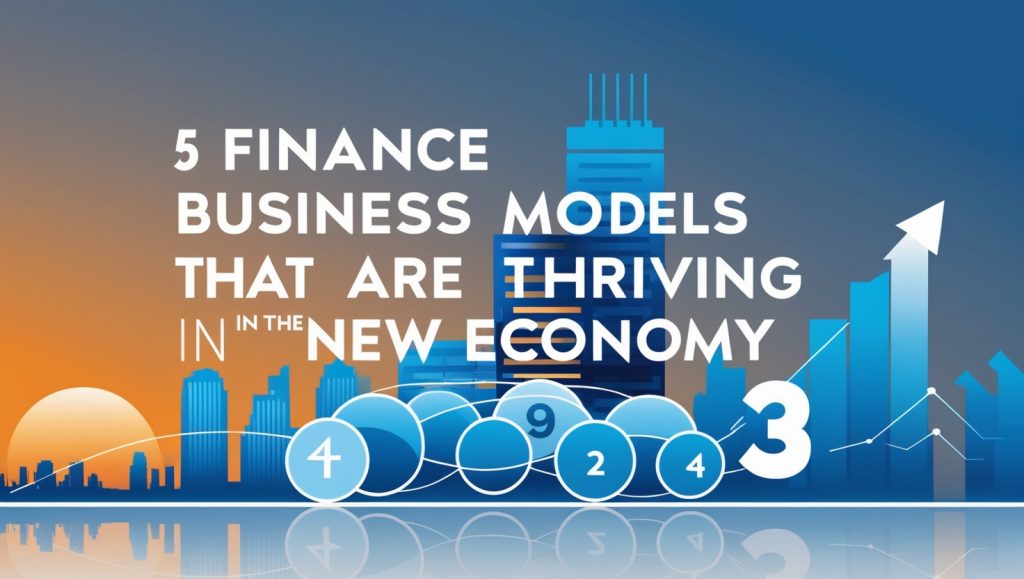
5 Finance Business Models That Are Thriving in the New Economy
5 Finance Business Models That Are Thriving in the New Economy-In the ever-changing landscape of the global economy, businesses must constantly adapt to new trends, emerging technologies, and shifting consumer preferences. The finance business is no exception. Over the past few years, we’ve seen a rise in innovative business models that leverage digital transformation, sustainability, and customer-centric strategies. These new models are reshaping the way financial services are delivered, making them more accessible, efficient, and tailored to the needs of modern consumers. In this article, we explore five finance business models that are thriving in the new economy.
1. Digital-First Neobanks

Traditional banks are facing increasing pressure from digital-first financial services providers. Neobanks—online-only, mobile-first banks—are one of the most disruptive finance business models in the current economy. Unlike traditional banks, neobanks operate without physical branches, offering a range of banking services through user-friendly mobile apps and web platforms.
Neobanks have gained significant traction due to their low-cost operations and ability to deliver seamless customer experiences. By eliminating the overhead of maintaining brick-and-mortar branches, neobanks can offer competitive fees, higher interest rates on savings, and greater transparency in terms of fees and services. These advantages have made neobanks especially popular among tech-savvy millennials and younger consumers.
In 2024, neobanks are expected to continue growing as they expand their services beyond basic banking to include personal loans, investment products, and insurance. Some neobanks have already integrated AI-powered financial advice and automated money management tools, providing customers with highly personalized financial experiences. For finance businesses, this model highlights the importance of digital transformation and a customer-centric approach in today’s competitive market.
2. Peer-to-Peer (P2P) Lending Platforms
Peer-to-peer (P2P) lending is another finance business model that has gained momentum in the new economy. P2P lending platforms connect borrowers directly with individual investors, bypassing traditional financial intermediaries like banks. These platforms allow individuals and small businesses to access loans at competitive interest rates, while providing investors with opportunities to diversify their portfolios and earn returns.
P2P lending offers a win-win for both parties: borrowers can secure funding quickly and without the strict requirements of traditional lenders, while investors gain access to a broader range of investment opportunities, often with higher returns than traditional investment vehicles. The growth of P2P lending is driven by the increasing demand for alternative finance options, as well as the rise of digital platforms that facilitate secure transactions and lending agreements.
In 2024, P2P lending is expected to expand as more investors and borrowers recognize the benefits of this model. The integration of blockchain technology and AI-driven risk assessments could make these platforms even more efficient and secure, further fueling their growth. For finance businesses, embracing P2P lending as part of their offerings can help them diversify their portfolios and tap into new revenue streams. (Read More: Mastering the Art of Finance: Strategies for Financial Success)
3. Sustainable and Green Finance

With growing awareness of climate change and environmental issues, sustainable finance is quickly becoming a dominant force in the finance business landscape. Green finance, which includes investments in renewable energy, sustainable infrastructure, and environmentally-friendly projects, is thriving as both consumers and investors increasingly seek to align their financial decisions with their values.
In 2024, sustainable finance is gaining traction as more businesses and governments commit to reducing their carbon footprint and achieving net-zero emissions. Green bonds, ESG (Environmental, Social, and Governance) investment funds, and impact investing are all examples of finance business models that focus on creating positive social and environmental outcomes while generating financial returns.
This growing emphasis on sustainability is reshaping the investment landscape, with finance businesses leveraging ESG metrics to attract socially-conscious investors. By incorporating sustainable finance practices into their offerings, finance businesses can tap into a rapidly expanding market while also contributing to global sustainability goals. For financial institutions, embracing sustainable finance not only meets demand but also presents opportunities for innovation in the development of green financial products and services. (Read More: The Importance of Data Analytics in Modern Finance and Accounting in 2024)
4. Robo-Advisory Services
Robo-advisors have transformed the way consumers approach investing. These AI-powered platforms use algorithms to provide automated, low-cost investment advice, portfolio management, and financial planning services. Robo-advisors have become increasingly popular due to their accessibility, ease of use, and ability to offer personalized investment strategies without the high fees associated with traditional financial advisors.
The robo-advisory business model is thriving because it democratizes investment management. It allows people with limited financial knowledge or small amounts of capital to access professional-grade investment advice and diversified portfolios. Many robo-advisors also offer tax-efficient strategies, risk assessments, and real-time portfolio adjustments based on market conditions.
In 2024, robo-advisory services are expected to continue growing as they evolve with new technologies like machine learning and big data analytics. These advancements will allow robo-advisors to offer even more personalized and sophisticated investment strategies. For finance businesses, integrating robo-advisory services can attract younger, tech-savvy clients who are looking for cost-effective and convenient ways to manage their investments. (Read More: Launch a Business Today)
5. Blockchain-Based Financial Services

Blockchain technology is revolutionizing the finance business, offering a decentralized and secure way to manage transactions and records. Initially popularized by cryptocurrencies like Bitcoin and Ethereum, blockchain has far-reaching applications beyond digital currencies. In 2024, blockchain-based financial services are thriving as the technology is increasingly adopted by banks, insurers, and fintech firms to enhance transparency, reduce fraud, and improve operational efficiency.
Blockchain’s potential in the finance industry is vast. It can streamline cross-border payments, enable faster and more secure transactions, and facilitate smart contracts that automatically execute agreements once certain conditions are met. Blockchain can also help finance businesses reduce costs associated with intermediaries, which is especially appealing in an environment where financial institutions are under pressure to lower their fees and increase efficiency.
In the coming years, blockchain’s role in the finance business is expected to expand as more companies integrate the technology into their operations. From improving payment systems to enabling decentralized finance (DeFi) platforms, blockchain is reshaping the future of financial services. For finance businesses, staying ahead of blockchain trends is critical for maintaining a competitive edge and offering cutting-edge financial solutions.
Conclusion article 5 Finance Business Models That Are Thriving in the New Economy
The finance business landscape is undergoing a profound transformation, driven by technological innovation, changing consumer preferences, and growing demand for sustainability. As we move into 2024, the finance industry is increasingly shaped by digital-first approaches, alternative lending platforms, and environmentally conscious investment strategies. Neobanks, P2P lending, sustainable finance, robo-advisory services, and blockchain-based solutions are all thriving as part of this new economy, and finance businesses that embrace these models will be well-positioned for long-term growth.
To stay competitive, financial institutions must embrace these evolving business models, leverage new technologies, and focus on providing value to their customers. The key to success in 2024 will be adaptability—being able to respond quickly to market shifts, customer needs, and technological advancements. By doing so, finance businesses can not only navigate the complexities of the new economy but also lead the charge in reshaping the future of finance.

1 thought on “5 Finance Business Models That Are Thriving in the New Economy”
Comments are closed.